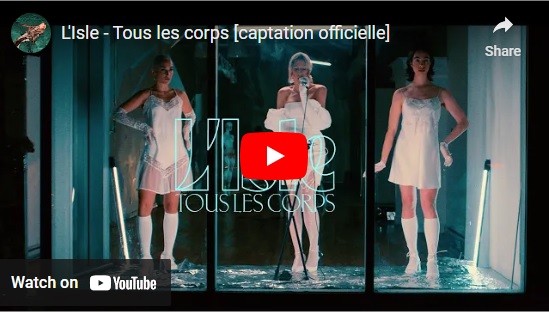“Christine and the Queens said that there’s no greater freedom than the freedom to be yourself. It’s true,” says singer-songwriter and performer Ariane Brunet who, after releasing three albums under her own name, has just issued Soif, her debut album under the name L’Isle. Following a career break, during which she went back to university and started a family, she found a new record label, Bravo Musique, and a new pop sound that’s simultaneously electronic, rhythmic, and more modern.
 “For me, L’Isle is like a new project,” says Brunet. “I understand it’s kind of blurry in people’s minds, because it is still me writing and singing. The difference between what I’ve put out under the name of Ariane Brunet and under the name of L’Isle isn’t that great,” she says, “yet it makes all the difference.”
“For me, L’Isle is like a new project,” says Brunet. “I understand it’s kind of blurry in people’s minds, because it is still me writing and singing. The difference between what I’ve put out under the name of Ariane Brunet and under the name of L’Isle isn’t that great,” she says, “yet it makes all the difference.”
Synthesizers bring a new colour and freshness to her output. Somewhat evocative of Christine and the Queens, her new tunes fit L’Isle like a glove. “She and I have had the same influences. I believe we may have listened to the same music when we were younger. Although I haven’t yet figured out why, when I was younger, I was listening to James Brown and Whitney Houston, and Corneille was one of my earliest influences because he was singing in French,” says Brunet, also mentioning The Weeknd, the American singer Banks, and the Swedish singer Lykke Li.
Brunet was 19 when she put out her debut album Le pied dans ma bulle, in 2020. She was 22 when Fusée came out, and 24 when Stella was released. “I was young, and I felt embarrassed when other musicians were comparing me with musicians who were 15 years my senior, but that’s what was happening at the time,” she says. When her first recording contract expired, she went through a period when she was trying to find herself as a musician by writing for other artists, and working as a background singer for the French-language TV programme Y’a du monde à messe, hosted by Christian Bégin, on Télé-Québec.
“I also managed to go back to university to study creative writing,” she says. “I met a whole bunch of new musicians. I had to explore in order to be able to become the person I enjoy being now. I questioned myself, both in terms of my own self-image, and my creative credo. I came to understand that I love the idea of a musical project that calls for an immersive experience. There’s more to an artist’s world than just the music.”
While all of her previously released albums under the name of Ariane Brunet have a musical identity of their own, L’Isle’s new esthetic direction puts her new project in a class by itself. “Everything changed when I started writing words from a melody or rhythm,” she explains. “In the past, the songs felt like they were getting written more freely – when you start a song by playing on a guitar, by following the melody of the rhythm, words and music just come together. This time, however, by using the rhythm and the melody as a base, I was more able to work on both the rhythm of my voice, and on the lyrics. That was the hardest part: helping the words make sense while making sure they sounded right.”
Which brings us to the meaning of the singer’s new name. L’Isle is the old spelling of the French word l’île (or the island in English), but with the exact same pronunciation as isle). She chose this new name mainly because she’s from Montréal’s West Island. Another reason was that L’Isle grew up in a primarily English-speaking neighbourhood. “My dad is a veteran Bill 101 fighter,” she says. “Every time we entered a business establishment, there was a new fight for us to get served in French. When people addressed him in English, he systematically answered in French – sometimes pretending he didn’t understand English.
“In school, French was spoken in class, but English was used in the schoolyard. The West Island was a beautiful place to live in, but as I was growing up, the fight for the French language became my own. And I got angry every time someone said that all French music sounded the same. For me personally, it was important to write and sing in French, and as a singer-songwriter and performer now, I want to make our language sound good. The meaning of words and phonetics are super important in a song. I want the songs to be meaningful and sound great, to get all those who claim it’s not possible to make good music in French to shut up.”
